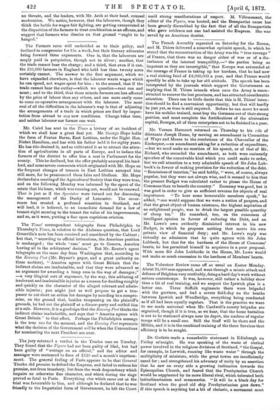The Times' correspondent telegraphs from Philadelphia to Thursday's Times, in
relation to the Alabama question, that Lord Granville's note has been received and considered by the Cabinet ; but that, "according to official intimations, the American position is unchanged ; the whole ' case ' must go to Geneva, America leaving all to the arbitrators' decision." But Mr. Reuter's agent telegraphs on the same day from Washington that, according to the Evening Post (Mr. Bryant's paper, and a great authority on these matters), "America agrees with Great Britain that the indirect claims are inadmissible, and that they were advanced as an argument for awarding a lump sum in the way of damages ;" —a very illogical sort of argument, by the way, this adducing of irrelevant and inadmissible injuries as a reason for deciding roughly and quickly on the character of the alleged relevant and admis- sible injuries ; you might just as well propose to get a tres- passer to cut short an action for damages by acceding to a compro- mise, on the ground that, besides trespassing on the plaintiff's grounds, he had cut the plaintiff at a dinner-party and outbid him at a sale. However, it is a good sign that the Evening Post thinks the indirect claims inadmissible, and says that "America agrees with Great Britain" to that effect. Perhaps the Philadelphia message is the true one for the moment, and the Evening Post represents what the decision of the Government will be when the Conventions for nominating the next President are over.


































 Previous page
Previous page